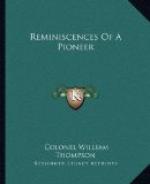Among the latter was Warm Spring Johnny. He was taken to the officer who had succeeded Watson in command. Great surprise was expressed at seeing a white man with the Snakes and the soldiers were for making short work of the “white renegade.” But it soon became evident that he was as much a wild Indian as any of them, and his youth, about 18, making in his favor he was turned over to the Warm Spring captors to guard, along with the other captives. They were all taken down the little branch a few hundred yards and securely bound and tied to a stunted juniper tree. During the night the Warm Springs indulged in a war dance, each lucky warrior flourishing the scalp he had taken. Along past midnight all the captives excepting Johnny were securely bound to the juniper with green rawhide, a mass of sage brush collected and the captives roasted alive. Johnny told me that every moment he expected to be served in the same manner, and could not understand why his comrades were burned while he was saved. He said he supposed that his skin being white they had reserved him for some particular occasion. I asked him if the soldiers knew that the captives were being burned. He replied that he learned afterwards that the Indians told the soldiers they had all escaped except the white one. The probabilities are that the soldiers were too busy with their own troubles to pay any attention to what was going on in the camp of their allies.
Johnny could speak fairly good English, but to all intents and purposes he was as much of an Indian as any of his copper colored friends. He was adopted into the Warm Springs tribe and remained with them for a number of years, but marrying a squaw from another tribe moved to the Willamette Valley, where he lived and died an Indian. He was almost invaluable to me because of his knowledge of the ways and signs of the Snakes. But aside from this he was absolutely useless as he was an arrant coward and could not be depended on when danger threatened.
The next day we moved south and after a rapid march reached the Elkins ranch on Grindstone, a tributary of Crooked River. It was known that the Indians were returning practically by the same route they had previously traveled, and our duty was to prevent raids from the main body and protect the property of the settlers as far as was possible.
First gaining permission from Gen. Brown, with my scouts and four volunteers, I started out to discover the camp of the Indians, which from the lay of the country, I thought likely would be at the head of Buck Creek, at a spring in the edge of the timber. About 2 o’clock we arrived at the vicinity of the supposed camp of the Indians, and taking an elevated position, patiently waited for dawn. Finally the gray dawn began to peep over the crest of the eastern mountains, and leading our horses we moved closer. When daylight finally arrived we were within a hundred yards of the spring, but nowhere was there a sign of life.




